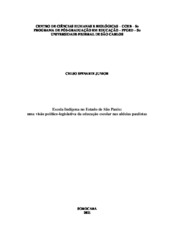| dc.contributor.author | Spinardi Junior, Celso | |
| dc.date.accessioned | 2022-07-29T19:26:43Z | |
| dc.date.available | 2022-07-29T19:26:43Z | |
| dc.date.issued | 2022-07-05 | |
| dc.identifier.citation | SPINARDI JUNIOR, Celso. Escola indígena no estado de São Paulo: uma visão político-legislativa da educação escolar nas aldeias paulistas. 2022. Dissertação (Mestrado em Educação) – Universidade Federal de São Carlos, Sorocaba, 2022. Disponível em: https://repositorio.ufscar.br/handle/ufscar/16437. | * |
| dc.identifier.uri | https://repositorio.ufscar.br/handle/ufscar/16437 | |
| dc.description.abstract | The right to access education is of undeniable importance, but there is a significant gap between the guaranteed right and its effective access. Society has historically been mobilized through the formulation and implementation of educational policies, in order to reduce the effects of inequalities, respecting differences. The proposed research intended to carry out an ethnography in an Indigenous State School in São Paulo, with marked differences and inequalities, scarce educational resources and visible difficulties. Because it is not only an indigenous community, but also a needy community, located on the outskirts of the city, as urbanization approaches more and more, causing the inhabitants to experience a high and forced degree of urban interaction. However, with the advent of the pandemic, the work proposal changed, acquiring a strictly documentary character, focused on data collection and the elaboration of a bibliographic work methodology, involving critical interlocutors, seeking a dense description of the environment and its interactions, showing the peculiarities of the relationships between those involved, the guaranteed rights, the resources effectively made available and their curricular practices, since the documentary research carried out pointed out the ways and identified at least one possible divergence between the consulted norms, comparing the constitutional right to the proper processes of learning and use of the indigenous mother tongue with the curricula established by the state government. | eng |
| dc.description.sponsorship | Coordenação de Aperfeiçoamento de Pessoal de Nível Superior (CAPES) | por |
| dc.language.iso | por | por |
| dc.publisher | Universidade Federal de São Carlos | por |
| dc.rights | Attribution-NonCommercial-NoDerivs 3.0 Brazil | * |
| dc.rights.uri | http://creativecommons.org/licenses/by-nc-nd/3.0/br/ | * |
| dc.subject | Direito | por |
| dc.subject | Desigualdades | por |
| dc.subject | Diferenças | por |
| dc.subject | Educação | por |
| dc.subject | Escola Indígena | por |
| dc.subject | Law | eng |
| dc.subject | Inequalities | eng |
| dc.subject | Differences | eng |
| dc.subject | Education | eng |
| dc.subject | Indigenous School | eng |
| dc.title | Escola indígena no estado de São Paulo: uma visão político-legislativa da educação escolar nas aldeias paulistas | por |
| dc.title.alternative | Indigenous school in the state of São Paulo: a political-legislative vision of school education in the villages of São Paulo | eng |
| dc.type | Dissertação | por |
| dc.contributor.advisor1 | Marques, Sílvio César Moral | |
| dc.contributor.advisor1Lattes | http://lattes.cnpq.br/6047434055828372 | por |
| dc.description.resumo | O direito ao acesso à educação é de importância incontestável, porém existe uma distância relevante entre o direito garantido e seu efetivo acesso. A sociedade tem se mobilizado historicamente por meio da formulação e implementação de políticas educacionais, no sentido de diminuir os efeitos das desigualdades, respeitando as diferenças. A pesquisa proposta pretendia realizar uma etnografia em uma Escola Estadual Indígena paulista, com diferenças e desigualdades acentuadas, recursos educacionais escassos e dificuldades visíveis. Por tratar-se não apenas de uma comunidade indígena, mas também de uma comunidade carente, localizada na periferia da cidade, uma vez que a urbanização se aproxima cada vez mais, fazendo com que os habitantes experimentem um grau alto e forçado de interação urbana. Porém, com o advento da pandemia, a proposta de trabalho mudou, adquirindo um caráter estritamente documental, focado no levantamento de dados e na elaboração de uma metodologia de trabalho bibliográfico, envolvendo interlocutores críticos, buscando uma descrição densa do ambiente e suas interações, mostrando as peculiaridades das relações entre os envolvidos, os direitos garantidos, os recursos efetivamente disponibilizados e suas práticas curriculares, uma vez que a pesquisa documental realizada apontou os caminhos e identificou ao menos uma possível divergência entre as normas consultadas, comparando o direito constitucional aos processos próprios de aprendizagem e uso da língua materna indígena com as grades curriculares fixadas pelo governo estadual. | por |
| dc.publisher.initials | UFSCar | por |
| dc.publisher.program | Programa de Pós-Graduação em Educação - PPGEd-So | por |
| dc.subject.cnpq | CIENCIAS HUMANAS::EDUCACAO::ADMINISTRACAO EDUCACIONAL | por |
| dc.subject.cnpq | CIENCIAS HUMANAS::EDUCACAO::CURRICULO | por |
| dc.subject.cnpq | CIENCIAS HUMANAS::EDUCACAO::ENSINO-APRENDIZAGEM | por |
| dc.subject.cnpq | CIENCIAS HUMANAS::EDUCACAO::FUNDAMENTOS DA EDUCACAO | por |
| dc.subject.cnpq | CIENCIAS HUMANAS::EDUCACAO::ORIENTACAO E ACONSELHAMENTO | por |
| dc.subject.cnpq | CIENCIAS HUMANAS::EDUCACAO::PLANEJAMENTO E AVALIACAO EDUCACIONAL | por |
| dc.subject.cnpq | CIENCIAS HUMANAS::EDUCACAO::TOPICOS ESPECIFICOS DE EDUCACAO | por |
| dc.publisher.address | Câmpus Sorocaba | por |
| dc.contributor.authorlattes | http://lattes.cnpq.br/6229648923105416 | por |


